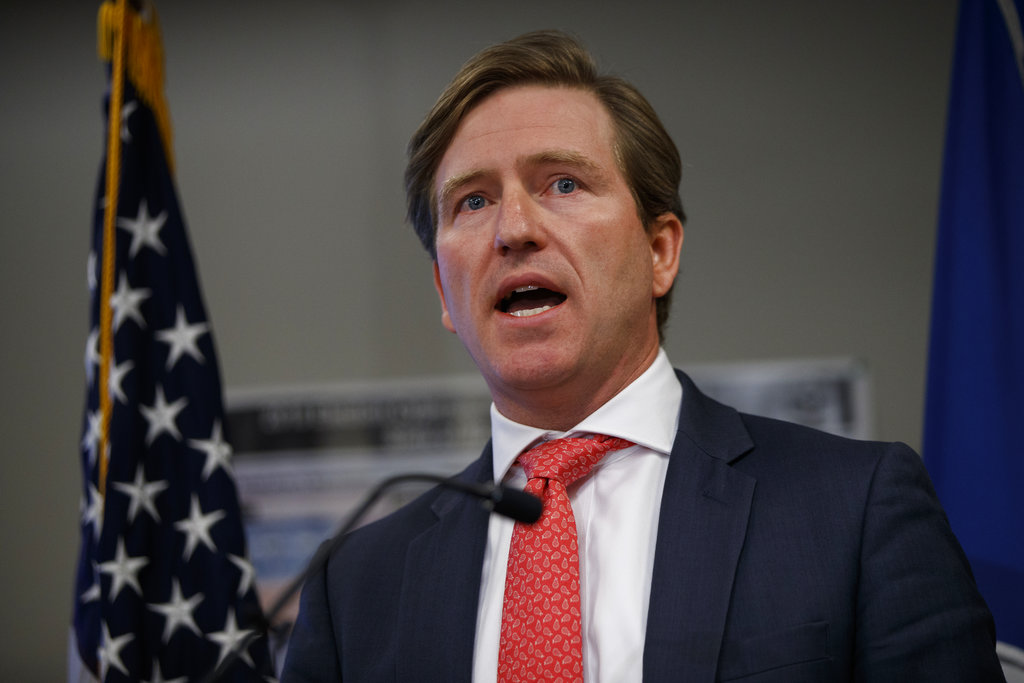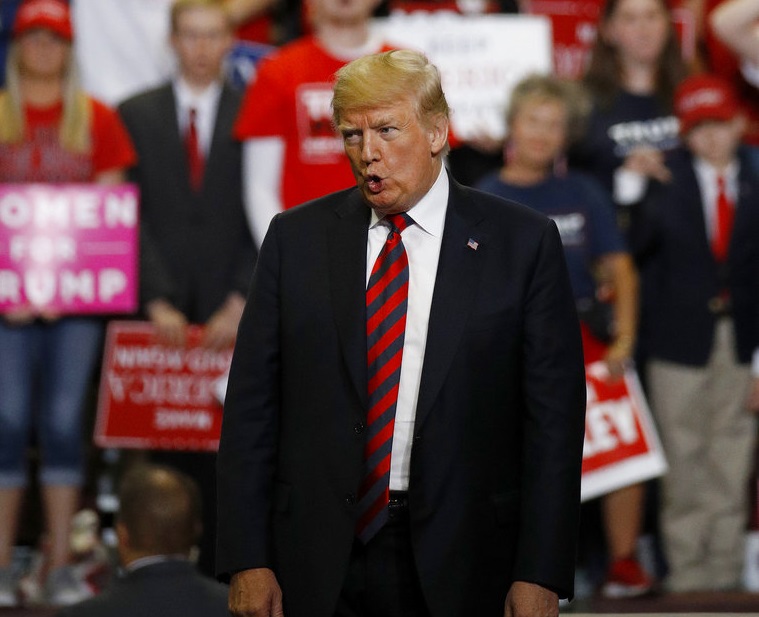The US accused a Russian woman on Friday of helping oversee the finances of a sweeping, secretive effort to sway American public opinion through social media in the first federal case alleging foreign interference in the 2018 midterm elections.
The criminal complaint against Elena Alekseevna Khusyaynova alleges that Russians are using some of the same techniques to influence US politics as they relied on ahead of the 2016 presidential election, methods laid bare by an investigation from special counsel Robert Mueller into possible coordination between Russia and Donald Trump’s campaign.
Justice Department prosecutors claim that Khusyaynova, of St Petersburg, helped manage the finances of a hidden but powerful Russian social media effort aimed at spreading distrust for American political candidates and causing divisions on hot-button social issues like immigration and gun control.
The Justice Department unsealed the criminal complaint on the same day that US intelligence agencies, in a rare public statement , asserted that Russia, China, Iran and other countries are engaged in continuous efforts to influence American policy and voters in the upcoming elections and beyond. National security adviser John Bolton heads to Russia on Saturday.
The US is concerned about the foreign campaigns “to undermine confidence in democratic institutions and influence public sentiment and government policies”, said the statement from national security officials. The statement, which provided no details about any such efforts, said: “These activities also may seek to influence voter perceptions and decision-making in the 2018 and 2020 US elections.”
The national security agencies said they currently do not have any evidence that voting systems have been disrupted or compromised in ways that could result in changing vote counts or hampering the ability to tally votes in the midterms, which are 2½ weeks away.
“Some state and local governments have reported attempts to access their networks, which often include online voter registration databases, using tactics that are available to state and nonstate cyber actors,” they said.
But so far, they said, state and local officials have been able to prevent access or quickly mitigate these attempts.
Prosecutors allege that Khusyaynova worked for the same social media troll farm that was indicted earlier this year by Mueller, and the social media effort they outlined Friday largely mirrors the special counsel's criminal case against three Russian companies, including the Internet Research Agency, and 13 Russians — including a close ally to Russian President Vladimir Putin.
The conduct singled out on Friday runs afoul of criminal laws that bar foreign nationals from attempting to influence American elections or from engaging in political activities without first registering with the attorney general, prosecutors said. The new prosecution was brought not by Mueller but by the Justice Department’s national security division and prosecutors from the Eastern District of Virginia. There is no allegation in the complaint of coordination with the Trump campaign.
Asked about the new accusation against the Russians, Trump responded that it had “nothing to do with me”.
The court papers pull back the court papers on a Russian effort to use thousands of fake social media profiles, and email accounts that appeared to be from people inside the US, to influence American politics. The goal was not necessarily to espouse one political ideology over another, prosecutors say, but rather “create and amplify divisive social and political content”, including on significant current events such as deadly shootings in South Carolina and Las Vegas, prosecutors said.
One fake persona, registered to “Bertha Malone”, made over 400 Facebook posts containing inflammatory content. One post falsely alleged ties between President Barack Obama and the Muslim Brotherhood. Another fake Facebook account, in the name of “Rachell Edison”, made more than 700 posts focused on gun control and the Second Amendment.
The Russian organisers of the conspiracy advised that the posts should reflect various viewpoints, and they gave specific instructions to only share articles from certain news websites to correspond to specific political views, prosecutors said.
“If you write posts in a liberal group... you must not use Breitbart titles,” one of the group’s members warned, court papers say. “On the contrary, if you write posts in a conservative group, do not use Washington Post or BuzzFeed's titles.”
After one news article targeting Republican Sen. John McCain appeared online with the headline “McCain Says Thinking a Wall Will Stop Illegal Immigration is ‘Crazy,’” members of the group were told to brand him as “an old geezer who has lost it and who long ago belonged in a home for the elderly”. They were also told to say that McCain had a “pathological hatred toward Donald Trump and toward all his initiatives”.
McCain, a longtime foe of Putin’s, died in August of brain cancer.
After another article appeared about Mueller, members of the troll farm were told to share the article and say Mueller was a “puppet of the establishment” who had connections to the Democratic Party and “who says things that should either remove him from his position or disband the entire investigation commission”.
Russian deputy foreign minister Sergei Ryabkov said recently that Russia has no intention of interfering in the midterm elections.
Friday’s separate statement about foreign influence in US elections was issued just weeks before the November 6 elections by the Office of the Director of National Intelligence, the Justice Department, the FBI and the Department of Homeland Security.
Given the breadth of alleged interference by Russia, which includes the hacking of Democratic email accounts ahead of the 2016 presidential election, it was notable that the intelligence community identified two other nations, China and Iran, in the same statement.
Vice-President Mike Pence recently blasted China in a speech, saying Russia’s influence efforts in America pale in comparison with the covert and overt activities of the Chinese to interfere in the midterms and counter Trump's tough trade policies against Beijing. But top administration officials have provided little evidence that China’s activities are comparable to Russia’s massive covert measures spelled out in previous indictments obtained by Mueller.
The officials have cited largely public steps taken by China, such as aiming tariffs at politically important states and pressuring US businesses to speak out against the Trump administration.
Other countries are using social media to amplify divisive issues in American society and sponsor content in English-language media, such as Russia's RT and Sputnik news outlets, the security agencies’ statement said. They also distribute propaganda and plant disinformation against political candidates, the departments said.
Intelligence agencies have not publicly released evidence of Iran working to meddle in U.S. elections. In March, however, the Trump administration announced criminal charges and sanctions against Iranians accused in a hacking scheme to pilfer sensitive information from hundreds of universities, private companies and American government agencies.
Lawmakers said the newest criminal complaint is proof that Russian meddling did not stop in 2016.
“Russian disinformation efforts are ongoing and sophisticated, and they are intent on dividing us and weakening our society and political system,” said California Rep. Adam Schiff, the ranking Democrat on the House intelligence committee.












